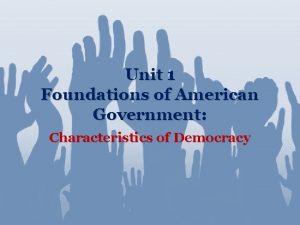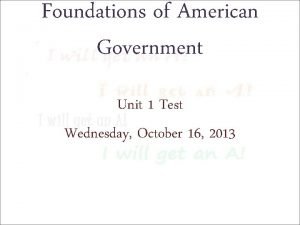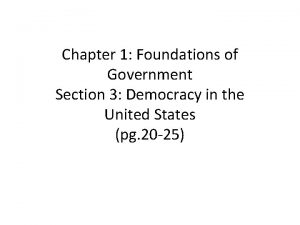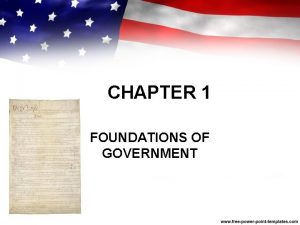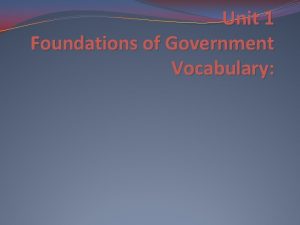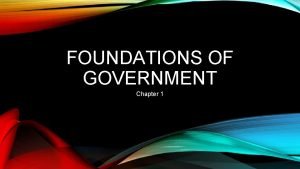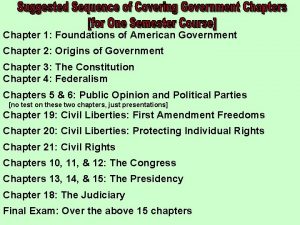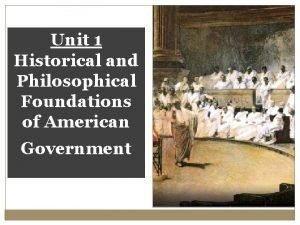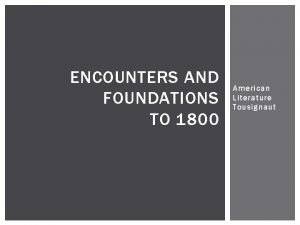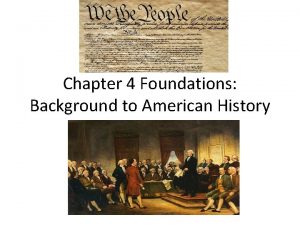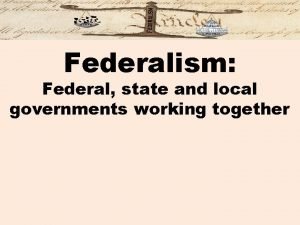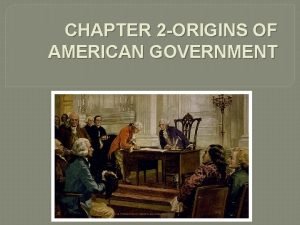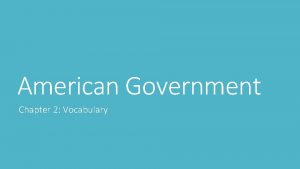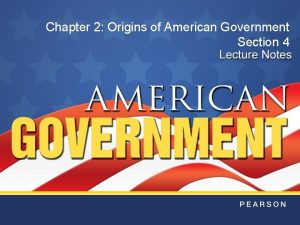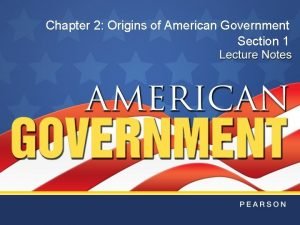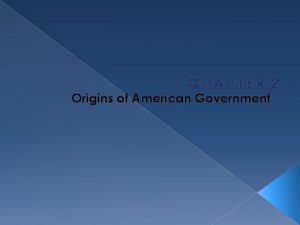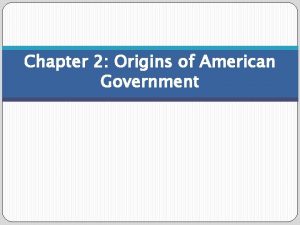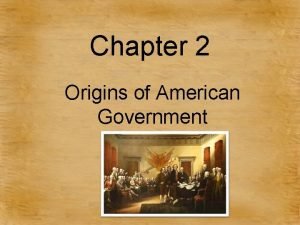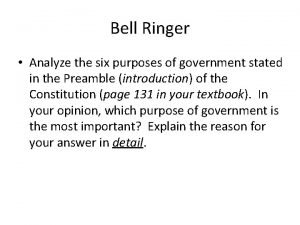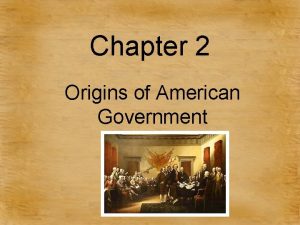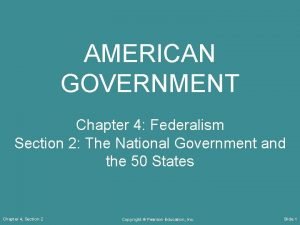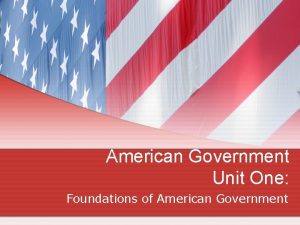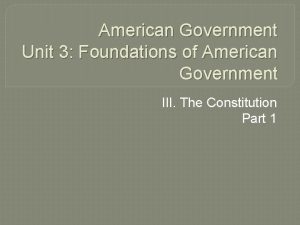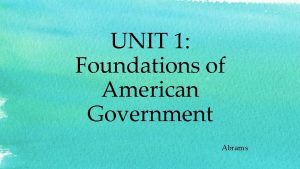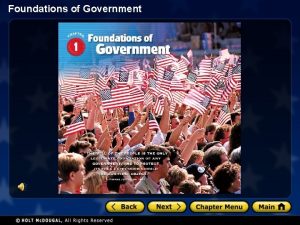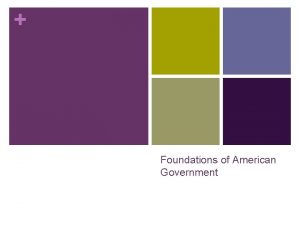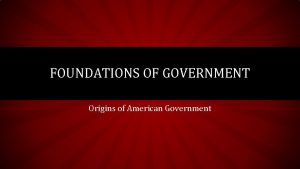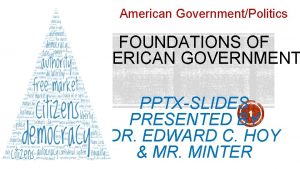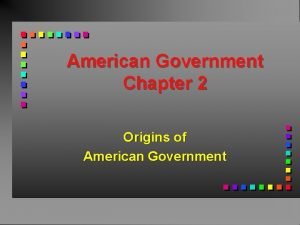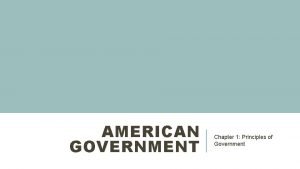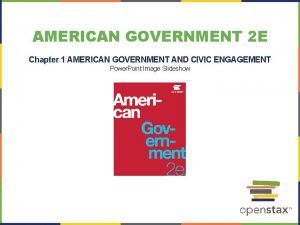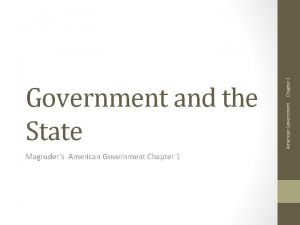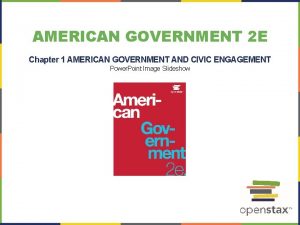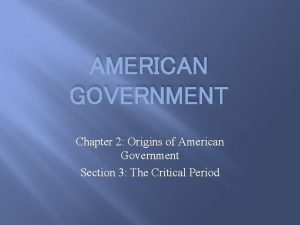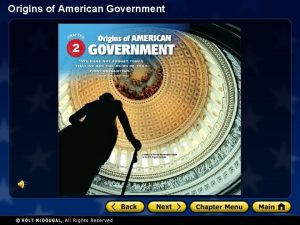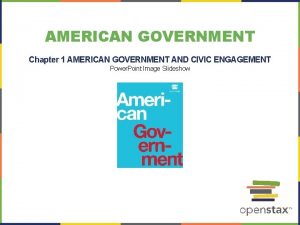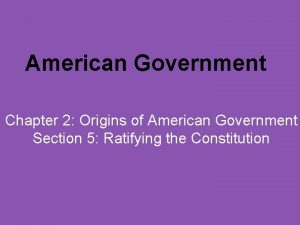UNIT 1 Foundations of American Government FOUNDATIONS OF






















- Slides: 22

UNIT 1 Foundations of American Government

FOUNDATIONS OF GOVERNMENT

LESSON 1: PURPOSES AND ORIGINS OF GOVERNMENT

THE FUNCTIONS OF GOVERNMENT • Legitimate governments create order, protect people, and give people ways to settle disagreements • Governments provide leadership, order, security, and defense • To fulfill its purpose governments make rules that everyone must follow Providing Leadership • Government officials set priorities and make all sorts of decisions on behalf of the people. • They can require that people do things they not do voluntarily • Without leadership there would be anarchy

Maintaining Order • Governments try to control and contain conflict between people • Governments provide some sort of domestic security force • Governments provide courts and other ways for people to resolve conflicts Providing Public Services • Creating schools, build sewer systems, pave roads, and provide other services that individuals cannot or would not do on their own • They can also promote public health and safety

Providing National Security • They also provide protection against attacks from other countries or terrorists • Some states do have trade relationships with other nations that the national government can put limitations on Providing Economic Security & Assistance • They protect the economic security of their people • Governments might intervene in the economic affairs of another nation to promote it’s own national security • They set policies to protect people’s economic security

NATION, STATE, AND COUNTRY • These terms can sometimes be interchangeable • A nation is considered a sizable group of people who believe themselves united by common bonds of race, language, custom, or religion • In the United States a state is considered a subdivision of the whole country • A state could also mean a political community that occupies a definite territory and has an organized government (same thing as a country)

THE STATE The state can be defined as having these four characteristics:

ORIGINS OF THE STATE The Force Theory • The force theory states that one person or a small group took control of an area and forced all within it to submit to that person’s or group’s rule. The Evolutionary Theory • The evolutionary theory argues that the state evolved naturally out of the early family. The Divine Right Theory • The theory of divine right holds that God created the state and that God gives those of royal birth a “divine right” to rule. The Social Contract Theory • The social contract theory argues that the state arose out of a voluntary act of free people.

LESSON 2: TYPES OF GOVERNMENT

CLASSIFYING GOVERNMENTS Governments can be classified by three different standards: (1) Who can participate in the governing process. (2) The geographic distribution of the governmental power within the state. (3) The relationship between the legislative (lawmaking) and the executive (law-executing) branches of the government.

CONSTITUTIONAL GOVERNMENTS • A constitution is a plan that provides the rules for government • Major purposes of a constitution – It sets out ideals that the people believe in and share – It establishes the basic structure of government – It provides the supreme law for the country • Constitutions may be written or unwritten • Constitutions have the authority to place clearly recognized limits on the powers of those who govern (limited government) • They are incomplete guides on how the country should be run • The constitution doesn’t always reflect actual government practices

MAJOR TYPES OF GOVERNMENT Democracy • In a democracy, supreme political authority rests with the people. • A direct democracy exists where the will of the people is translated into law directly by the people themselves. • In an indirect democracy, a small group of persons, chosen by the people to act as their representatives, expresses the popular will. Dictatorship • A dictatorship exists where those who rule cannot be held responsible to the will of the people. • An autocracy is a government in which a single person holds unlimited political power. • An oligarchy is a government in which the power to rule is held by a small, usually self-appointed elite.

MAJOR TYPES OF GOVERNMENT Unitary Government • A unitary government has all powers held by a single, central agency. Confederate Government A confederation is an alliance of independent states. Monarchy • Some are not authoritarian • Monarch’s power can be limited by tradition or law • Most monarchies today are constitutional monarchies (example: Great Britian)

CLASSIFICATION BY THE RELATIONSHIP BETWEEN LEGISLATIVE AND EXECUTIVE BRANCHES

FORMS OF GOVERNMENT

LESSON 3: ROLES OF GOVERNMENT IN ECONOMIC SYSTEMS

FUNDAMENTALS OF ECONOMICS • Economics is the study of how people and nations use their limited resources to attempt to satisfy wants and needs • Some political systems let free market determine how resources are used • Other systems the government regulates/controls resources • A key function of government is to make essential decisions about the economy • All economies must answer three key questions: – What and how much should be produced? – How should goods and services be produced? – Who gets the goods and services that are produced?

CAPITALISM • Is an economic system that emphasizes private ownership of the factors of production, freedom of choice, and individual incentives • The government does not interfere with the economy • This economic system assumes that the best way to serve society is to let people produce, sell, and buy as they wish Free Enterprise in the United States • A true and total capitalist system does not exist in reality, but the US is the closest example • The US society is deeply rooted in the value of individual initiative • The US respects the right of all persons owning private property • The US also recognizes the freedom to make economic choices • The US government does regulate many aspects of the economy, which makes it not a pure capitalistic system

MIXED ECONOMIES • Combine elements of capitalism and socialism • Examples of countries with mixed economies: US and Mexico • Why is the US classified as a mixed economy – The federal government has grown to become the single largest buyer of goods and services – The federal government has become more involved in regulating industries to protect the consumer – The Great Depression created an economic emergency that propelled government action

SOCIALISM • Is an economic system in which the government plays a significant role in the economy, but does not completely control it • It owns most land, basic industries, and other means of production • Government planners determine the use of resources and distribute the products and wages • The government provides extensive social services such as education, health care, and welfare for its people • The goal is to distribute everything equally

COMMUNISM • The government decides how much to produce, and how to distribute the goods and services produced • The state owns land, natural resources, industry, banks, and transportation facilities • There is no private property • Government controls mass communication • All decisions on how the country should be done are handed down by the upper levels of government Communism Today • Only a handful of countries that are communist exist (North Korea) • Most communist states vary on how much of the economy is state controlled (China)
 Unit 1 foundations of american government
Unit 1 foundations of american government Foundations of american government unit 1 test review
Foundations of american government unit 1 test review Ap government and politics unit 1 study guide
Ap government and politics unit 1 study guide Foundations of government section 3
Foundations of government section 3 Foundations of government chapter 1
Foundations of government chapter 1 Foundations of government vocabulary
Foundations of government vocabulary Chapter 1: foundations of government pdf
Chapter 1: foundations of government pdf Foundations of government (chapter 1 test form a)
Foundations of government (chapter 1 test form a) Philosophical foundations of the american revolution
Philosophical foundations of the american revolution Foundations and encounters early american literature
Foundations and encounters early american literature Chapter 4 foundations background to american history
Chapter 4 foundations background to american history What are the three levels of government
What are the three levels of government Chapter 2 american government
Chapter 2 american government Chapter 2 origins of american government vocabulary
Chapter 2 origins of american government vocabulary Origins of american government section 4
Origins of american government section 4 Chapter 2 origins of american government answer key
Chapter 2 origins of american government answer key Chapter 2: origins of american government worksheet answers
Chapter 2: origins of american government worksheet answers Origins of american government section 1
Origins of american government section 1 Origins of american government section 1
Origins of american government section 1 Chapter 2 lesson 1 government in colonial america answers
Chapter 2 lesson 1 government in colonial america answers What are the six purposes of government
What are the six purposes of government Chapter 2 origins of american government
Chapter 2 origins of american government American government chapter 4
American government chapter 4
